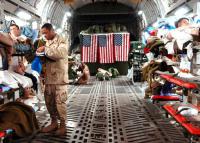-
Want to prevent lone wolf terrorism? Promote a “sense of belonging”

Why are we seeing a rash of lone-wolf terrorist attacks in Europe and especially in France, and are measures such as the burkini ban in France effective in countering them? What have we learned from the horrors of the Charlie Hebdo shooting, the murder of 130 people in and around Paris last November, the Bastille Day truck attack in Nice, and the killing of an 85-year-old priest inside of a church in Normandy? How can we hope to prevent future attacks? Security can be heightened, and intelligence efforts can be redoubled, but these measure may not be sufficient. We need to change our focus, to examining these perpetrators’ “sense of belonging” rather than looking for reasons to detain or expel them because they don’t belong.
-
-
GW Program on Extremism expands research, expertise
Since its launch in June 2015, the George Washington University’s Program on Extremism has contributed research and analysis on violent and non-violent extremism. GW notes the program’s report ISIS in America: From Retweets to Raqqa has been used by policymakers and law enforcement as a trusted source. Now in its second year, program leadership says they will continue to grow as a leading resource of expertise and research on extremism by expanding with new initiatives and hires.
-
-
ISIS’s second-in-command killed in Syria
In the most serious blow to ISIS leadership yet, Abu Muhammad al-Adnani, the Islamist group’s second-in-command, was killed by a coalition airstrike. The U.S.-led coalition has been systematically going after ISIS leadership. In the last six months airstrikes killed the organization’s No. 4 — finance minister Haji Iman — and No. 3, the group’s defense minister, Omar al-Shishani.
-
-
Practical guide on how to counter extremists’ narratives in South East Asia
On Tuesday, the Hedayah Institute launched its latest compendium and report titled Undermining Violent Extremist Narratives in South East Asia. The report contains practical advice for civil society organizations and practitioners to develop effective narratives that counter the approaches of ISIS, al-Qaeda, Jemaah Islamiyah, and other violent extremists in the region. The guide also contains clear examples of counter-messages, case studies, and links to videos and Web sites that are relevant to supporting the development of counter-narratives.
-
-
Former senior Obama official: Inaction in Syria result of desire to keep Iran deal alive
The White House’s failure to stop the ongoing slaughter perpetrated by the Syrian regime of Bashar al-Assad stems from President Barack Obama’s “desire to accommodate Iran” so that last year’s nuclear deal will extend past his administration, the president’s former top Syria adviser charged.
-
-
A momentous peace deal with the FARC – so what next for Colombia?

After more than fifty years of armed conflict, and four years of negotiations, the Colombian government and the leftist guerrilla group, the FARC, have reached a final peace agreement. The historic deal looks set to bring to an end the longest running war of recent history. The agreement is cause for huge celebration, but an official end to war with the FARC is only the start of the road to peace. Both ex-guerrillas, and military personnel who may have to leave the armed forces due to budget cuts, will now face the difficulties of a transition into civilian life. Reintegration programs are crucial not only for former combatants but also for those who have served their country for years. Securing peace therefore requires the coordination of all security-related government institutions across ministries, in partnership with the UN, and in line with the protection needs of civilians. This joint effort can boost confidence in tackling both immediate and long-term security challenges, paving the way for the Colombian people to vote “yes” to peace.
-
-
Up to 15,000 ISIS victims buried in 72 mass graves found in Syria, Iraq
The vast areas in Syria and Iraq which came under the control of ISIS in 2014 are dotted with grim reminders of the Islamist group’s brutality. The AP reports that a comprehensive survey by the news agency, using satellite imagery, excavations, mapping, and survivors testimony, has identified seventy-two mass graves in Syria and Iraq – containing up to 15,000 bodies — and that many more such graves will be discovered as the U.S.-led coalition is pushing ISIS back and shrinking the territory under the group’s control.
-
-
Iraqi government-backed militias recruiting children
Iraqi government-backed militias have recruited children from at least one displaced persons camp in the Kurdistan Region of Iraq to fight against Islamic State forces. “The recruitment of children as fighters for the Mosul operation should be a warning sign for the Iraqi government,” said a senior children’s rights researcher. “The government and its foreign allies need to take action now, or children are going to be fighting on both sides in Mosul.”
-
-
How victims of terror are remembered distorts perceptions of safety
From 2002 through 2015, eighty Americans were killed in terrorist attacks. The fifty-seven killed in 2016 almost equals the total of the previous thirteen years. In 2013, the most recent year for which there are comprehensive statistics from the FBI, 13,716 Americans were murdered, the equivalent of an Orlando massacre every thirty-two hours. In 2014, 32,675 Americans died in car accidents. In other words, the fifty-seven Americans who died in terrorist attacks in 2016 were equal to 0.42 percent of all murders and 0.17 percent of all traffic deaths. Why do the terrorist attacks get so much media coverage? Why is fear of terrorism a major issue in the current election? The reason: victims of domestic terrorism are viewed as casualties in the War on Terror. A relatively few deaths thus become manifestations of a war come home to America. Those few highly publicized deaths provoke levels of fear and anger that make it difficult to think clearly about the actual causes of these crimes and conceive of governmental policies that actually might make prevent future attacks.
-
-
Two Americas: U.S. wars take uneven toll

In today’s wars, Americans who die or are wounded in battle are disproportionately coming from poorer parts of the country. By analyzing over 500,000 American combat casualties from the Second World War through Iraq and Afghanistan, researchers found growing socioeconomic inequality in military sacrifice.
-
-
Europol deploys 200 counterterrorism officers to Greece to thwart ISIS infiltration
Rob Wainwright, the chief of Europol, the EU’s law enforcement agency, said that 200 counter terrorism officers will be deployed to the Greek islands within weeks in an effort to thwart a “strategic”-level campaign by ISIS to infiltrate terrorists into Europe. The new task force will be deployed alongside Greek border guards and use technologies developed by British security forces at Heathrow to help spot potential terrorists.
-
-
Mayors of French coastal towns refuse to rescind burkini ban despite Friday’s court ruling
The majority of French mayors who have issued bans on the wearing of burkini on municipal beaches are refusing to lift the restrictions even though France’s highest administrative court on Friday ruled that prohibiting the ban would be a “serious and manifestly illegal violation of fundamental freedoms.” The burkini bans have plunged France into an intense debate about secularism, freedom of religion, and how best to help integrate Muslims into French life and culture.
-
-
Ex-Shin Bet chief: Hezbollah “learning to fight on a large scale” in Syria, threatening Israel
The Iran-backed terror group Hezbollah is gaining valuable experience while “learning to fight on a large scale” in Syria, a former Shin Bet chief told a visiting delegation of U.S. congressional advisers last Monday. Avi Dichter, currently the chairman of the Knesset’s Foreign Affairs and Defense Committee, said Hezbollah in Syria is “learning to fight on a large scale, in platoons and battalion, while using sophisticated weaponry and heavy, precise arms that they receive from Iran.” These new capabilities will ensure that the “next round” in the conflict between Hezbollah and Israel will be much different.
-
-
French court suspends Burkini ban, declaring the prohibition “clearly illegal”
France’s highest administrative court has earlier today (Friday) ruled that Burkini bans now enforced on the country’s beaches are illegal and a violation of fundamental liberties. Burkinis are swimsuits covering the hair and body, which some Muslim women in France began to wear earlier this summer, arguing the Burkini allows them to go the beach while preserving their modesty. Supporters of the ban argue that the. The spread of the Burkini bans from Nice, where it was launched, to many beach communities around the country, has sparked an intense debate about France’s secular values, women’s rights, and religious freedom.
-
-
Watchdog: Evidence suggests Assad kept chemical weapons program in violation of 2013 deal
After launching a lethal sarin gas attack in August 20013 — which killed 1,400 Sunni civilians in a Damascus suburb — the Assad regime agreed to get rid of its nerve agents under the supervision of OPWC, the UN chemical weapons watchdog. In summer 2014 OPCW announced that Syria’s declared chemical weapons stockpile had been removed – but in a classified report submitted Wednesday to the Security Council, OPWC says that Syria has violated the 2013w agreement by keeping some of its chemical weapons program, and by continuing to use chemical weapons in attacks against civilians.
-
- All
- Regional
- Water
- Biometrics
- Borders/Immig
- Business
- Cybersecurity
- Detection
- Disasters
- Government
- Infrastructure
- International
- Public health
- Public Safety
- Communication interoperabillity
- Emergency services
- Emergency medical services
- Fire
- First response
- IEDs
- Law Enforcement
- Law Enforcement Technology
- Military technology
- Nonlethal weapons
- Nuclear weapons
- Personal protection equipment
- Police
- Notification /alert systems
- Situational awareness
- Weapons systems
- Sci-Tech
- Sector Reports
- Surveillance
- Transportation
Advertising & Marketing: advertise@newswirepubs.com
Editorial: editor@newswirepubs.com
General: info@newswirepubs.com
2010-2011 © News Wire Publications, LLC News Wire Publications, LLC
220 Old Country Road | Suite 200 | Mineola | New York | 11501
Permissions and Policies
Editorial: editor@newswirepubs.com
General: info@newswirepubs.com
2010-2011 © News Wire Publications, LLC News Wire Publications, LLC
220 Old Country Road | Suite 200 | Mineola | New York | 11501
Permissions and Policies
